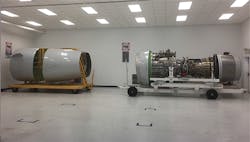2016 IW Best Plants Winner: Lean Helps UTC Take Flight and Soar
Product lifecycles in the aerospace industry are significantly longer than for other manufactured products. While some industries face rapid obsolescence of their products (processed food, of course, but also high-tech gadgets), airplanes are expected to last for decades, given their high-ticket initial cost. So too, then, each major component of the aircraft must be built to last… for a long time.
However, UTC Aerospace Systems–Aerostructures, based in Foley, Ala., measures time not in decades or years or even hours, but in seconds. A typical 8-hour shift, minus breaks, occupies 25,200 seconds. For example, one of the Foley site’s production lines produces four sets of major nacelle components—a nacelle is the aerodynamic structure that surrounds a jet engine—for the Boeing 737NG every day. That means that production line needs to move every 6,300 seconds, explains Darrell Wilson, the plant manager at the Foley facility. Large takt time clocks spread throughout the facility tick down from “6300” four times a day to ensure every employee is working towards achieving that goal, at a cadence made possible by the plant’s long history of continuous improvement initiatives. The idea, Wilson says, is that by reducing a second here and a second there from the process, day in and day out, pretty soon you find you’ve saved an entire hour.
The Foley plant manufactures nacelle system components for all of the leading commercial airplane manufacturers, including Airbus, Boeing, Bombardier and Embraer, as well as components for some military aircraft manufacturers. The facility was acquired in 2012 by United Technologies Corp., an industrial technology conglomerate known for its ACE (Achieving Competitive Excellence) corporate continuous improvement program, but the Foley plant’s lean culture actually dates back to the mid-1990s, when as part of the Goodrich organization, it implemented the Toyota Production System (TPS).
“We were already very familiar with the basic continuous improvement philosophy when UTC introduced ACE to us,” notes Don Chesscher, operations manager. “Traditionally, we looked at waste in the assembly process, and UTC as a corporation tends to look more at quality and the mechanical process. But at the end of the day, it’s still all about waste, and that’s what we focus on eliminating.”
To that end, each employee uses very detailed standard work to manufacture components to the customer’s requirements. How detailed? UTC Aerostructures has documented more than 30,000 pages of standard work in support of its operations.
UTC Aerospace Systems – AerostructuresFoley, Ala. Employees: 583, non-union Total Square Footage: 232,000 Primary Product/Market: Aerospace engine nacelle components Start-up Date: 1984 Achievements: Work-in-process, finished goods inventory and average days on hand for raw material have decreased 15% over past three years; first-pass yield for all finished products is at 99.6%. |
“One day you think something is part of the standard work process, but the next day you notice there is waste in that process,” Wilson explains. “Having standard work processes is key to where we are today.”
Henry Mott, quality/ACE manager, relates an example of how one reluctant worker became a passionate convert to standard work. “One of our employees was struggling with standard work and takt time,” he remembers. “She was nervous, feeling she was being watched, until she started to see how her productivity and performance gradually improved over time. She was redeployed to another area of the plant that wasn’t using standard work, and she became a very vocal proponent that her new area begin instituting standard work. You could say she became a true believer because she saw how standard work helped her.”
A recent acquisition of a robotic fastener installation machine has led to significant improvements in quality and safety—and slashes cycle time by about two-thirds.
Later this year, UTC Aerostructures will go live with a 80,000 sq. ft. plant expansion in support of the Airbus A320 platform, which is manufactured nearby in Mobile, Ala. Part of this expansion will be a purpose-built showroom where Airbus and its customers can inspect and approve components prior to their shipment to other facilities for installation.
About the Author
Dave Blanchard
Senior Director of Content
Focus: Supply Chain
Call: (941) 208-4370
Follow on Twitter @SupplyChainDave
During his career Dave Blanchard has led the editorial management of many of Endeavor Business Media's best-known brands, including IndustryWeek, EHS Today, Material Handling & Logistics, Logistics Today, Supply Chain Technology News, and Business Finance. He also serves as senior content director of the annual Safety Leadership Conference. With over 30 years of B2B media experience, Dave literally wrote the book on supply chain management, Supply Chain Management Best Practices (John Wiley & Sons, 2010), which has been translated into several languages and is currently in its second edition. He is a frequent speaker and moderator at major trade shows and conferences, and has won numerous awards for writing and editing. He is a voting member of the jury of the Logistics Hall of Fame, and is a graduate of Northern Illinois University.
